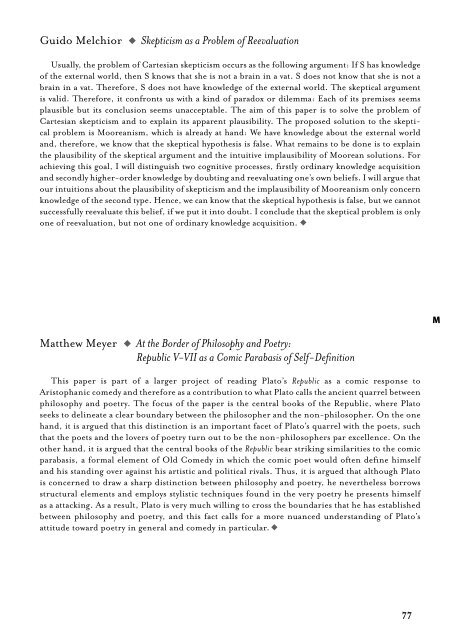Verlag.Buchhandel.Service. - Österreichische Gesellschaft für ...
Verlag.Buchhandel.Service. - Österreichische Gesellschaft für ...
Verlag.Buchhandel.Service. - Österreichische Gesellschaft für ...
Erfolgreiche ePaper selbst erstellen
Machen Sie aus Ihren PDF Publikationen ein blätterbares Flipbook mit unserer einzigartigen Google optimierten e-Paper Software.
Guido Melchior ◆ Skepticism as a Problem of Reevaluation<br />
Usually, the problem of Cartesian skepticism occurs as the following argument: If S has knowledge<br />
of the external world, then S knows that she is not a brain in a vat. S does not know that she is not a<br />
brain in a vat. Therefore, S does not have knowledge of the external world. The skeptical argument<br />
is valid. Therefore, it confronts us with a kind of paradox or dilemma: Each of its premises seems<br />
plausible but its conclusion seems unacceptable. The aim of this paper is to solve the problem of<br />
Cartesian skepticism and to explain its apparent plausibility. The proposed solution to the skeptical<br />
problem is Mooreanism, which is already at hand: We have knowledge about the external world<br />
and, therefore, we know that the skeptical hypothesis is false. What remains to be done is to explain<br />
the plausibility of the skeptical argument and the intuitive implausibility of Moorean solutions. For<br />
achieving this goal, I will distinguish two cognitive processes, firstly ordinary knowledge acquisition<br />
and secondly higher-order knowledge by doubting and reevaluating one’s own beliefs. I will argue that<br />
our intuitions about the plausibility of skepticism and the implausibility of Mooreanism only concern<br />
knowledge of the second type. Hence, we can know that the skeptical hypothesis is false, but we cannot<br />
successfully reevaluate this belief, if we put it into doubt. I conclude that the skeptical problem is only<br />
one of reevaluation, but not one of ordinary knowledge acquisition. ◆<br />
Matthew Meyer ◆ At the Border of Philosophy and Poetry:<br />
Republic V-VII as a Comic Parabasis of Self-Definition<br />
This paper is part of a larger project of reading Plato’s Republic as a comic response to<br />
Aristophanic comedy and therefore as a contribution to what Plato calls the ancient quarrel between<br />
philosophy and poetry. The focus of the paper is the central books of the Republic, where Plato<br />
seeks to delineate a clear boundary between the philosopher and the non-philosopher. On the one<br />
hand, it is argued that this distinction is an important facet of Plato’s quarrel with the poets, such<br />
that the poets and the lovers of poetry turn out to be the non-philosophers par excellence. On the<br />
other hand, it is argued that the central books of the Republic bear striking similarities to the comic<br />
parabasis, a formal element of Old Comedy in which the comic poet would often define himself<br />
and his standing over against his artistic and political rivals. Thus, it is argued that although Plato<br />
is concerned to draw a sharp distinction between philosophy and poetry, he nevertheless borrows<br />
structural elements and employs stylistic techniques found in the very poetry he presents himself<br />
as a attacking. As a result, Plato is very much willing to cross the boundaries that he has established<br />
between philosophy and poetry, and this fact calls for a more nuanced understanding of Plato’s<br />
attitude toward poetry in general and comedy in particular. ◆<br />
77<br />
M


